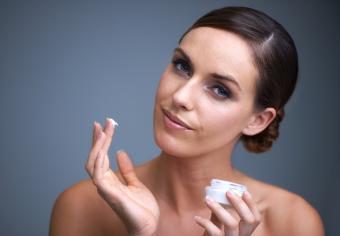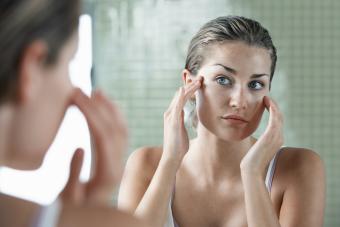
Sunscreens, like other skin care products, contain multiple ingredients - any of which could lead to an unwanted skin reaction. A hypoallergenic label on a skin care product is usually meaningless because cosmetic product labeling is not well-regulated by the Food and Drug Administration (FDA). Other product labels used to suggest low allergy or irritant potential (such as 'gentle', 'sensitive skin', 'natural', etc.) are also not reliable. Examine sunscreen labels carefully to find products with fewer ingredients that are more likely sensitize your skin.
Allergens to Watch for in Sunscreens
According to the Journal of Allergy, the ingredients in skin care products that are known allergens include fragrances, dyes, parabens and preservatives. With sunscreens, some of the synthetic ingredients that block ultraviolet rays can also cause a reaction in people with skin sensitivities.
Six Recommended Hypoallergenic Sunscreens
The products listed here and contain fewer additives than traditional sunscreens. They are less likely to be allergenic but there is no guarantee they won't cause a skin reaction in some people.
Some of these products are marketed specifically as hypoallergenic products, yet contain parabens and other substances that could lead to allergic reactions in some people. The ones that are not specifically promoted as hypoallergenic are included because they do not contain the ingredients most likely to cause allergic reactions.
Each product contains titanium dioxide and zinc oxide as the non-synthetic mineral sun filters, unless otherwise noted.
1. Aveeno® Natural Protection Lotion Sunscreen
Aveeno® Natural Protection Lotion Sunscreen with Broad Spectrum SPF 50 provides ultraviolet radiation (UVA and UVB) sun protection. This sunscreen contains oat extract that soothes skin. It does not contain fragrances, para-amino benzoic acid (PABA), avobenzone or oils. There are multiple ingredients, including propylene glycol, but the product has good reviews on the Aveeno® website as a hypoallergenic sunscreen. It retails for just under $11 for three ounces. A version for babies that has the same ingredients is available for the same price.
2. Coppertone® Sensitive Skin Faces Sunscreen
Coppertone® Sensitive Skin Faces Sunscreen SPF 50 contains the synthetic sun blockers oxtinoxate, octisalate in addition to zinc oxide and provides full UVA and UVB sun protection. This sunscreen contains fewer ingredients than the Aveeno products. It does not contain dyes, fragrances, alcohols or oils but contains parabens and propylene glycol. This product retails for just over $7. 50 for two ounces.
3. Coppertone® Water BABIES® Pure & Simple
Coppertone® Water BABIES® Pure & Simple Sunscreen Lotion With SPF 50 also contains the active ingredients oxtinoxate, octisalate and zinc oxide and provides full sun protection. This sunscreen for babies is free of fragrances, oils and dyes and does not sting the eyes as much as the adult version. It contains parabens and glycols, but favorable reviews on Amazon indicate the product is good for sensitive skin. It costs less than $10 for eight ounces.
4. Vanicream Sunscreen Broad Spectrum SPF 50+
Vanicream Sunscreen Broad Spectrum SPF 50+ gives full body sun protection. This pricier sunscreen has no perfumes, parabens, dyes, oxybenzone, PABA, and preservatives. It, however, contains some alcohols and glycols which could be drying or sensitizing. Vanicream Sunscreen is rated as a top sunscreen by the Environmental Working Group (EWG). It also has favorable reviews on AchooAllergy.com. It retails for around $18 for a four-ounce tube.
5. Raw Elements USA Eco Formula 30+
Raw Elements USA Eco Formula 30+ has only zinc oxide as the sun filter. It provides complete UVA and UVB protection and contains sunflower, hemp and rosemary oils, as well as cocoa and mango butter, teas and vitamin E. It does not contain fragrance, PABA, parabens or alcohols. This sunscreen is also rated as a top product by the EWG. It is available for around $19 for a three-ounce tube.
6. Caribbean Solutions Faces Only
Caribbean Solutions Faces Only Sunscreen SPF 20 contains only a few ingredients including, aloe and other plant extracts and vitamin E. It does not contain chemical fragrances, dyes, or parabens or PABA. This sunscreen is listed on EWG as a top product. It costs just under $17 for three ounces.
Specific Ingredients to Avoid
When you are searching for hypoallergenic sunscreen, avoid products that contain the following substances:
- Fragrances are a frequent ingredient in many categories of skin care products. They are one of the most common allergens. The fragrance can be synthetic or come from the botanicals in the products.
- Dyes, a common additive to skin products and foods are regulated by the FDA. Fortunately dyes are rarely added to sunscreens. If your sunscreen is not white or clear it likely contains a dye and you should avoid it.
- Preservatives such as butylated hydroxytoluene (BHT) and methylisothiazolinone or parabens (such as propyl paraben) and formaldehyde, can irritate skin and eyes and are toxic to living cells.
- Propylene glycol is used as an emulsifier to make ingredients blend better; it can irritate skin especially people with eczema and other skin disorders.
- Plant extracts used as antioxidants or as fragrance to enhance the products can irritate skin or act as allergens.
- Retinyl palmitate and other retinols derivatives of vitamin A can sensitize the skin on exposure to the sun and also lead to a phototoxic or allergic reaction and may be toxic to cells.
- Benzophenones such as oxybenzone, dioxybenzone and sulisobenzone are among a group of UVB filters that can cause contact allergic and photo-allergic dermatitis.
- Dibenzoylmethanes such as avobenzone is mostly a UVA blocker with some protection against UVB rays and can cause contact allergic and photo-allergic dermatitis.
- Para-aminobenzoic acid (PABA) can block UVB rays effectively but is a known skin sensitizer. It is now less frequently used in skin care products.
- Some alcohols, such as ethyl alcohol (ethanol), can dry, penetrate and irritate the skin and increase the chance of eczema. Mist spray sunscreens contain these types of alcohols, so it's best to avoid them altogether. Other types of sunscreens may have them as well.
Read Product Labels
Manufacturers can make creative claims for sunscreens and other skin care products as long as they don't cross the line and claim medicinal benefits. Be wary of colorful and appealing labels on products that can't stand up to their claims.
Scrutinize a product's ingredient label to try to avoid sunscreens which can cause you an allergy or other skin sensitivity. Remember, also, that you can react even to products with few or milder ingredients because the body's immune response is unpredictable and complicated. Consult your doctor for allergy testing if you have repeated reactions to sunscreens or other skin care products.







